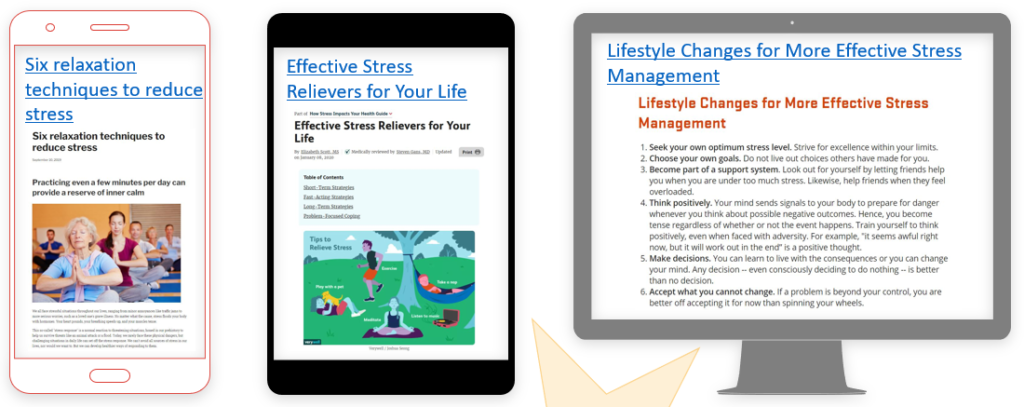
Modul 4
"Stress Management Techniques"
"Stress Management Techniques"
Ziel
The purpose of this module is to explain in detail what stress is, when it can become a problem and how it influences our personal lives and work performance. Afterwards, several techniques how to prevent and manage stress are presented.
Am Ende dieses Moduls sollten Sie in der Lage sein,...
Wissen
- Explain what stress is, list its types, causes and signs, as well as the health issues it can cause and how it affects a person’s behaviour
- Understand various ways how to prevent, reduce or cope with stress factors
Fähigkeiten
- Recognise when a healthy amount of stress becomes a problem and identify what is causing it
- Use stress management techniques in daily life to manage and reduce experienced stress
Haltungen
- Adopt life changes that should result in a lower amount of stress (building supportive relationships, eating healthy food, reducing smoking and drinking, regular exercise, or meditation) and not be afraid to look for professional help if necessary.
Wichtige Konzepte
Stress
Stress is the reaction of the human body to changes, from every day situations to important events such as marriage, divorce, etc.
It is not possible to avoid it completely, but it is reachable to eliminate unnecessary stress and manage it.
Some causes of stress are quite common, while other can be unique.
Causes of stress
The causes of stress are known as „stressors“. They are individual for every person – what can be viewed simply as challenging can be a great source of stress for someone else.
People are commonly stressed by their work, relationships, finances, health and time management.
Learning how to manage stress can help people deal with stressors in their lives.
Effects of stress
The most common symptoms of stress are headaches and upset stomach. However, some effects can be more dangerous.
Stress influences immunity which is related to all aspects of health. Stress also affects the mood and mental well-being.
How to avoid stress
It is not advisable to avoid stressful situations that need to be paid attention to.
However, it is possible to avoid some stress by eliminating number of stressors.
For example, you can:
- Learn how to say no
- Avoid people who stress you
- Change the environment around you
- Prepare a to-do list and prioritize
- View problems from a more positive perspective
Stressbewältigung
Experienced stress can be managed in different ways. Each person needs to be treated individually – there is no universal advice that will work for everybody.
Stress management plans include stress relivers, developing stress-relieving habits and eliminating unnecessary stressors.
Benefits of stress management
Effective stress management will allow you to deal with stress in your life and you will be come happier and more productive. The goal is to lead a balanced life.
You will also be able to work under pressure and face challenges.
Common symptoms include…
- Troubles with sleeping
- Changes in weight
- Stomach pain
- Panic attacks
- Headache
- Heartburn
- Feeling overwhelmed
- Irritability
- Fatigue
What can a person do when he or she wants to be less affected by stress?
Possible answers
- Morning or evening walk
- Keeping a stress journal
- Making more time for friends
- Exercise
- Meditation, mindfulness or another form of relaxation
- Doing something enjoyable
- Sense of humor
- Better time management
- Get enough sleep
Answers!
Distress and eustress
There are two types of stress – distress and eustress. Distress has negative effects and can damage a human‘s health, while eustress makes us more energetic and motivated.
How can eustress be good
The perception of stress often depends on our mindset. We can see a stressor as a threat or as a challenge to overcome. Eustress keeps us excited about life – without it, we fould weel bored, or in worse case, depressed.
Examples of eustress
There are many good examples of eustress – such as going on a first date with someone new, first day at a new school or job, or going to see a horror movie.
Work Stress Management at Priority Data
Priority Data is a long-established reseller of computer anti-virus software. Having been consistently profitable for many years, changes in the market meant the company was making a loss. To regain its leading position in the industry, it set out to completely restructure its operation. However, while sales and profitability improved, it was at a slower rate than anticipated, and although the changes were taking effect, it was at a high personal cost – employees across the organisation were experiencing stress-related problems, including poor health, increased absenteeism and decreased productivity. It was middle managers who were experiencing the highest levels of stress resulting from the changes, especially as they perceived events to be beyond their influence or control.
To minimise the problem, a programme of stress coaching to run parallel with the change initiative was introduced. The aim was to address the issues of role clarity and responsibility and, vitally, involve employees in how changes were rolled out across the organisation. The result was a tangible reduction of stress-related problems, improved staff morale and an increase in sales and productivity.
Work Stress Management
What sources can cause stress at the work?
What are the consequences of stressful work environment for the company?
What solutions can be implemented to deal with stress at work?
Can stress ever be good or useful in work environment? Why or why not?
How do you handle stress? Do you have a strategy how to cope it with? Discuss.
Have you ever helped someone who was feeling stressed? What did you do?
What are some negative ways that people use to deal with stress? Do you deal with stress differently than your parents or siblings? If yes, how?
Stress Management
Sources of stress
There are three main sources of stress:
- Environmental – such as economic and political uncertainties, new technologies replacing human labour
- Organizational – for example, long working hours, job stability, incompetent management
- Personal – family, relationships, financial problems
Cost of stress for the company
Stress at the workplace leads to high costs for the organization. Some of the consequences are:
- Low productivity
- Low motivation
- Unplanned absences
- High turn over of employees
- Negative image of the company
Understand your stress
Feeling stressed is very individual. Try to understand better how stress feels for you, so you can be prepared.
Identify your stressors and learn to recognize stress signals. Avoid stressors when possible.
Work on healthy stress strategies
It is very useful to develop a healthy strategy for calming down. Some people cope with stress by smoking, drinking alcohol or overeating. While these might help with stress, they are definitely not a healthy option.
Focus on your general well-beling, including getting enough sleep, food, free time and exercise.
Don‘t be afraid to ask for help
When you feel like the stress is too pressuring, talk to a friend or a family member and ask for their support.
You can also talk with a healthcare professional who might suggest individual stress management techniques.
Techniques
Here are some more techniques you can try to reduce stress:
- Be more assertive and communicate clearly
- Go offline and work without being disturbed
- Manage your time effectively, prioritize and set realistic deadlines
- Create healthy boundaries
- Build resilience
- Talk about things that worry you (or at least write them down)
Personal stress management planning
Aktionsplan
1 – Avoid unnecessary stress
Get to know yourself and try to avoid people, places, things and memories that cause you stress.
Stop worrying about things that are out of your control and that you cannot fix.
Nevertheless, stress is not always avoidable. When a problematic situation arises, take time to evaluate how stressful it actually is.
2 – Take care of your body
Strong bodies are better at dealing with stress. There are many ways how to take better care of yourself.
You can try excercising, active relaxtion (such as yoga or meditation), and making changes in your eating or sleeping habits.
3 – Manage your emotions
The best way to enjoy your life and be happy is to learn how to manage stress and your emotions.
Learn how to relax, for example, you can read a book, go to a park, listen to music, dedicate yourself to a hobby, etc.
You deserve to feel good, so do not be afraid to ask for help if you feel like you need it.



